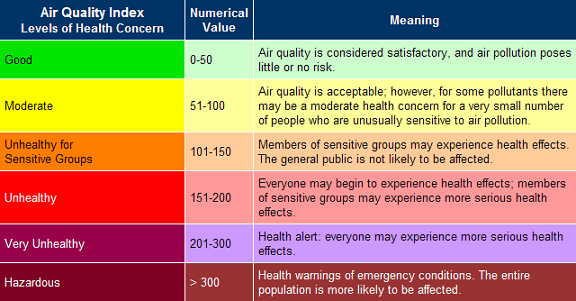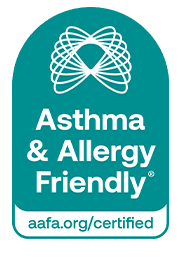Each year, wildfires rage across the U.S. Smoke in the air contains tiny particles that affect air quality. These particles can irritate your eyes, nose, throat and lungs. Poor air quality can worsen asthma symptoms. Children and those with respiratory disease like asthma are at high risk for asthma episodes when the air quality is poor.
Wildfires do not only affect those in the immediate fire area. Smoke can blow many miles away and impact people hundreds of miles away.
Be Prepared to Evacuate
If you live in an area that is prone to wildfires, you may need to prepare to evacuate. You will need to manage your asthma and any other health conditions in the event of an emergency.
Have an emergency kit ready to go in case you need to leave your home quickly. Wear a mask with a particulate respirator. Look for NIOSH and N95 or P100 printed on the mask. It should have two straps and should cover your nose and chin. Carry your quick-relief asthma medicine with you wherever you go.
Protect Yourself From Wildfire Smoke
If you are in an area affected by wildfire smoke, take precautions to protect yourself and your family from the poor air quality. If you are "down wind" from active fires, it is important to watch your air quality.

- Check your local air quality at AirNow.gov. You can also sign up to receive air quality email notices for your ZIP code.
- Check current fire and smoke conditions at Fire.AirNow.gov.
Stay indoors as much as possible and reduce physical activity outside.
- Keep window and doors closed to help prevent polluted outside air from getting in. Keep children in rooms/areas with cleaner air.
- Avoid using anything that burns, such as wood fireplaces, gas logs, gas stoves and candles.
- Don't do things in your home that stirs up particles already inside your home.
- Run your air conditioner if you have one. Set the air intake to "recirculate" and keep the filter clean. If you don't have air conditioning, staying inside with the windows closed may become dangerous if the weather is extremely hot. Seek alternative shelter.
- If you must go outdoors, wear a mask with a particulate respirator. Look for NIOSH and N95 or P100 printed on the mask. It should have two straps and should cover your nose and chin.
- Follow your Asthma Action Plan.
Protect Yourself During Cleanup
Disasters generate debris that can include building rubble, trees and shrubs, personal property, ash and charred wood. Follow your community management guidelines for disposal. Learn more from the Environmental Protection Agency (EPA) about handling debris.
Smoke and ash contain harmful particles that can irritate even healthy lungs.
- If you have to clean up ash on your property, wear a mask with a particulate respirator. Wash your clothes and shower as soon as possible after exposure.
- Keep children away from areas with ash until it has been cleaned.
- If your home has water damage, take steps to protect yourself from mold.
- Take steps to improve your indoor air quality as much as possible. Improve your home's indoor air quality by using CERTIFIED Asthma & Allergy Friendly® products, such as air filters, air cleaners, HVAC systems, vacuums, and more. To find out if a product meets our scientific standards to become CERTIFIED, look for this mark on the product's package or advertisements:
Updated January 8, 2025


Comments (1)